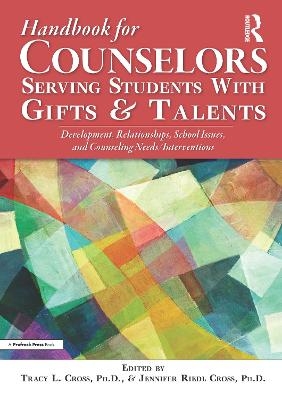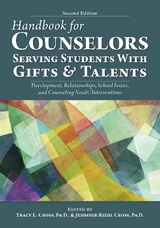
Handbook for Counselors Serving Students With Gifts and Talents
Prufrock Press (Verlag)
978-1-59363-841-2 (ISBN)
- Titel erscheint in neuer Auflage
- Artikel merken
Tracy L. Cross, Ph.D., holds an endowed chair, Jody and Layton Smith Professor of Psychology and Gifted Education, and is the executive director of the Center for Gifted Education and the Institute for Research on the Suicide of Gifted Students at William & Mary. Jennifer Riedl Cross, Ph.D., is Director of Research at the William & Mary Center for Gifted Education.
Introduction Section I: Theoretical Foundations/Conceptions of Giftedness Chapter 1: Differentiated Model of Giftedness and Talent Chapter 2: Achievement-Based Conceptions of Giftedness Chapter 3: Talent Development: From Theoretical Conceptions to Practical Applications Chapter 4: Overexcitabilities and Temperament Chapter 5: The Use of Intelligence Tests in Gifted Identification Chapter 6: Neuroscience and Giftedness Chapter 7: Introduction to Programming for Gifted Learners Section II: Special Populations Chapter 8: Counseling the Rural Gifted Chapter 9: Gifted Children in Urban Settings Chapter 10: Counseling Gifted GLBT Students Along Paths to Freedom Terence Chapter 11: Serving Artistically Gifted Children and Youth Chapter 12: Counseling for Young Gifted Children Chapter 13: Social-Emotional Needs of Gifted Students of Color Chapter 14: More Is Different: Understanding and Engaging the Exceptionally Gifted Child Robbie Robinson Hutchens and Martha J. Morelock Chapter 15: Twice-Exceptional Students Nina Yssel Section III: Developmental Issues Chapter 16: Asynchronous Development: A Key to Counseling the Gifted Chapter 17: Identity Development and Multipotentiality Chapter 18: Self-Concept of Gifted Students: A Multitheoretical Perspective Chapter 19: Developmental Issues for Gifted and Creative Girls: Milestones and Danger Zones Chapter 20: Addressing the Counseling Needs of Gifted Boys Chapter 21: The Optimal Moral Development of the Gifted: Interdisciplinary Insights About Ethical Identity Formation Section IV: Relationships Chapter 22: Lived Experience, Mixed Messages, and Stigma Chapter 23: Family Relationships Chapter 24: Peer Relationships Chapter 25: Gifted Students and Their Teachers: Relationships That Foster Talent Development Chapter 26: The Counseling Relationship Section V: School-Related Issues Chapter 27: School-Related Issues: Identifying Students With Gifts and Talents Chapter 28: Academic Planning for Gifted Students Chapter 29: The Importance of Teaching Strategies in the Education of the Gifted Chapter 30: Understanding and Addressing Underachievement in Gifted Students Chapter 31: Career Planning Chapter 32: Talent Search Chapter 33: The Role of Central Office and Building Administrators in Serving Gifted Students Chapter 34: Role of the School Psychologist Working With the School Counselor Section VI: Counseling Needs/Interventions Chapter 35: Misdiagnosis and Missed Diagnosis of Gifted Children: The Importance of Accurate Assessment Chapter 36: Perfectionism: A Counselor’s Role in a Recovery Process Chapter 37: Anxiety, Depression, and Resilience Chapter 38: Suicide and the Gifted Adolescent: Advice for Counselors Chapter 39: Counseling Needs and Interventions for Gifted Students: Personality Considerations and Social-Emotional Development Chapter 40: Social Coping Chapter 41: Differentiating Counseling Approaches for Gifted Children and Teens: Needs and Strategies About the Editors About the Authors
| Erscheint lt. Verlag | 1.12.2011 |
|---|---|
| Sprache | englisch |
| Maße | 152 x 229 mm |
| Themenwelt | Geisteswissenschaften ► Psychologie ► Pädagogische Psychologie |
| Sozialwissenschaften ► Pädagogik ► Sonder-, Heil- und Förderpädagogik | |
| ISBN-10 | 1-59363-841-8 / 1593638418 |
| ISBN-13 | 978-1-59363-841-2 / 9781593638412 |
| Zustand | Neuware |
| Haben Sie eine Frage zum Produkt? |
aus dem Bereich



